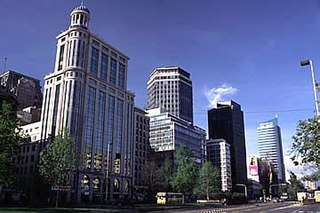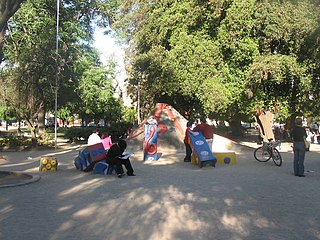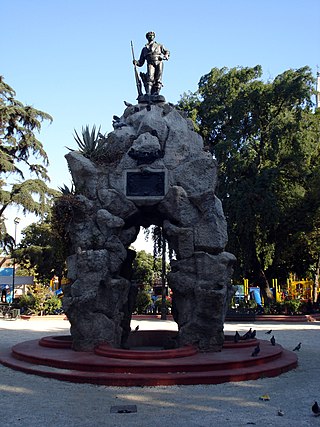
Santiago, also known as Santiago de Chile, is the capital and largest city of Chile and one of the largest cities in the Americas. It is located in the country's central valley and is the center of the Santiago Metropolitan Region, which has a population of seven million, representing 40% of Chile's total population. Most of the city is situated between 500–650 m (1,640–2,133 ft) above sea level.

The Santiago Metro is a rapid transit system serving the city of Santiago, the capital of Chile. It currently consists of seven lines, 143 stations, and 149 kilometres (92.6 mi) of revenue route. The system is managed by the state-owned Metro S.A. and is the first and only rapid transit system in the country.

Plaza Miserere is one of the main plazas (squares) of Buenos Aires, Argentina. It is located alongside the Once de Septiembre Station of the Ferrocarril Domingo Faustino Sarmiento in the heart of the Balvanera neighborhood.

Avenida Libertador General Bernardo O'Higgins, popularly known as 'La Alameda', is the main avenue of Santiago, Chile. It runs east-west in the centre of the greater urban area and is 7.77 km (4.83 mi) long, and it has up to 5 lanes in each direction. It was named after Chile's founding father Bernardo O'Higgins. It was originally a branch of the Mapocho River.

Quinta Normal Park is an urban park in the city of Santiago, Chile. The park is in a commune, or district of the same name, Quinta Normal. The park is bounded by Matucana Avenue to the east, Portales Avenue to the south and Santo Domingo Street to the north. It is home to several museums, including the Chilean National Museum of Natural History. Near the park is the Museum of Memory and Human Rights. The park is also near a public library.

Quinta Normal is an underground metro station on the Line 5 of the Santiago Metro. It is one of the largest metro stations in Santiago, Chile and provides access to Quinta Normal Park and Museum of Memory and Human Rights. Two glazed street-level entrances provide natural lighting for a portion of the station.

Lo Prado is an underground metro station on the Line 5 of the Santiago Metro, in Santiago, Chile. The entrance to the station is located in front of the town hall of Lo Prado. The station was opened on 12 January 2010 as part of the extension of the line from Quinta Normal to Pudahuel.

Gruta de Lourdes is an underground metro station on the Line 5 of the Santiago Metro, in Santiago, Chile. It is located close to the western branch of the Autopista Central and the Basilica of Lourdes. East of the station, Line 5 runs beneath Quinta Normal Park. The station was opened on 12 January 2010 as part of the extension of the line from Quinta Normal to Pudahuel.

República is an underground metro station on the Line 1 of the Santiago Metro, in Santiago, Chile. This station is named for República Avenue. The station was opened on 15 September 1975 as part of the inaugural section of the line between San Pablo and La Moneda.

Plaza Brasil is located in Barrio Brasil, a neighborhood of Santiago, Chile known for its strong artistic and cultural scene. The square is bordered by Avenida Brasil to the east, Huérfanos street to the south, Compañía de Jesús street to the north and Maturana street to the west. Access to the square is via the Cumming station of the Santiago Metro.

Santiago Metro Line 5 is one of the seven lines that currently make up the Santiago Metro network in Santiago, Chile. It has 30 stations and 29.7 km (18.5 mi) of track. The line intersects with Line 1 at Baquedano station and San Pablo station, with Line 2 at Santa Ana station, with the Line 3 at both Plaza de Armas station and Irarrázaval station, with Line 4 at Vicente Valdés station, and with line 6 at Ñuble station. It will also intersect and the future Line 7 at Baquedano station. Its distinctive colour on the network line map is green.

San Ramón station is a metro station located on Line 4A of the Santiago Metro in Santiago, Chile between Santa Rosa and La Cisterna station. It lies along the Vespucio Sur Freeway, near its junction with Almirante Latorre Street. The station has disabled access. The station was opened on 16 August 2006 as part of the inaugural section of the line between Vicuña Mackenna and La Cisterna.

Los Presidentes station is a metro station located on Line 4 of the Santiago Metro in Santiago, Chile. It lies on the junction of Vespucio Sur Freeway and Los Presidentes Avenue. The station has disabled access. It is the northernmost ground-level station on the line, before going underground heading towards the center of the city. The area around the station is predominantly residential to the west and dominated by the Cousiño Macul vineyard to the east.

Laguna Sur station is an underground metro station on the Line 5 of Santiago Metro network, in Santiago, Chile. It is located underneath the junction of Teniente Cruz Avenue with Laguna Sur Street, in the commune of Pudahuel between Las Parcelas station and Barrancas station.

Pudahuel is a rapid transit station on the Line 5. It is located underneath the junction of San Pablo Avenue and Teniente Cruz Avenue, underneath the border of Pudahuel and Lo Prado.

Barrancas is an underground metro station on Line 5 of the Santiago Metro network in Santiago, Chile. It is located underneath the junction of Teniente Cruz Avenue and General Bonilla Avenue on the border of the communes of Pudahuel and Lo Prado, between Laguna Sur station and Pudahuel station. It also lies parallel to the Route 68 highway which connects Santiago with Valparaíso and Viña del Mar, and the highway crosses over the underground metro line. The station has disabled access.
Santa Julia station is an embanked metro station located on Line 4A of the Santiago Metro in Santiago, Chile, between Vicuña Mackenna station and La Granja station in the commune of La Florida. It lies along the Vespucio Sur Freeway at the junction with Santa Julia Street. The station was opened on 16 August 2006 as part of the inaugural section of the line between Vicuña Mackenna and La Cisterna.

Barrio Yungay is a neighborhood of Santiago, Chile, located to the west of the city center in the commune of Santiago and to the west of Barrio Brasil.

Huérfanos Street is an east-west street in downtown Santiago, Chile. The word huérfanos is Spanish for orphans and the street is so named because an orphanage that was built here in 1758.

Line 7 is a new rapid transit line due to open on the Santiago Metro, in 2027. Intended to relieve the busy Line 1, the Line 7 will start in Renca in the northwest, passing through the city center, before ending in the borders of Las Condes and Vitacura in the northeast. Expected to be finished by 2028, it will add 19 new stations and 24.8 km (15.4 mi) of track to the system. Its distinctive color on the network line map is gray. Cost of construction has been set at $2.5 billion USD.




















